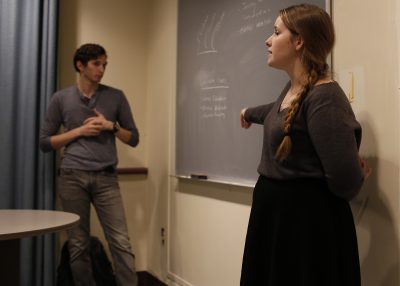
The Student Curriculum Committee, an independent student group focused on increasing student awareness and active participation in academics and administration at Boston University, held an open-forum meeting to talk about students’ concerns Tuesday evening.
Approximately 10 students attended the discussion in a College of Arts and Sciences classroom.
The group attempts to address underrepresented interests at BU, specifically in regards to education policies, SCC Chair Gregory Kerr wrote in an email before the event.
“We have residual projects from last year, namely general education and the Editorial Institute’s fight to stay alive,” Kerr wrote. “But we’re trying to broaden our view and get new perspectives on the problems we’re already addressing … When this school is often happy to ignore [those problems], we want to make sure we’re working for what the student body wants.”
The forum opened to the attendees to set new goals for this academic year in educating the student body on issues that are often kept in the dark, Kerr said. Among the topics that students brought up were BU’s responses to previous cases of sexual assault, efforts to deal with a rise in mental health concerns and the future the College of Fine Arts’ renovation.
During the discussion, students addressed the university’s introduction of the BU Hub, a four-year university-wide general education program that will be launched in Fall 2018 for incoming freshmen.
SCC Social Media Correspondent Kelsie Merrick said the SCC voices concerns over the initiative because it could overshadow programs that already exist on BU’s campus.
“One of our fears was that smaller groups and organizations in BU would be lost, like the [Arvind and Shandan Nadlal] Kilachand Honors College, the Core Curriculum and various other ones,” the CAS junior said.
Sylvia Reyes, a junior in CAS, said she attended the meeting to find out information about the BU Hub.
“I had no idea what [the Task Force on General Education] was trying to do,” Reyes said. “I would like to actually know what they are trying to implement to the new students and how that’s going to affect everyone else, especially in [those] core.”
The two SCC representatives also discussed the closing of the Editorial Institute. According to the Editorial Institute’s page on BU’s website, the programs’ primary aims are “the promotion of critical awareness of editorial issues and practices and the provision of training in editorial methods.”
“Dean [Ann] Cudd and CAS are saying, ‘Oh, well if your students aren’t getting teaching positions in editorial studies, then this program is clearly a failure,’” Kerr said. “Well, they’re ignoring the fact that of course they won’t, because this is a unique program.”
Furthermore, the SCC reflected on their protest held at the end of last semester to fight the lack of contract negotiation between BU and its adjunct faculty.
Two weeks after the protest, BU adjunct professors and the administration reached a three-year contract settlement, The Daily Free Press reported on April 29.
Merrick said lecturers at the university are encouraged by the effort, and “after they saw the adjuncts unionizing, they said ‘We need the same sort of justification.’”
Priest Gooding, a senior in CAS, said it is never too late to learn more about the BU community and its administration.
“Considering that I’m a student who is involved on campus, even when I’m about to graduate, I still want to see BU change in certain ways and improve its life for teachers and students,” Gooding said.


















































































































